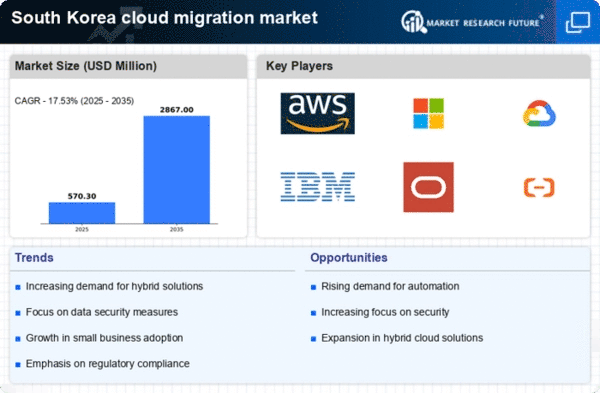Focus on Cost Efficiency
Cost efficiency remains a critical driver in the cloud migration-services market, particularly for small and medium-sized enterprises (SMEs) in South Korea. As these businesses strive to optimize their operational expenditures, migrating to the cloud presents a viable solution. By adopting cloud services, SMEs can reduce the need for extensive on-premises infrastructure, leading to significant cost savings. Recent statistics suggest that companies migrating to the cloud can achieve up to 30% reduction in IT costs. This financial incentive encourages a broader adoption of cloud migration services, as organizations recognize the potential for improved budget management and resource allocation. The cloud migration market is thus poised for growth as cost-conscious businesses increasingly turn to cloud solutions.
Rising Demand for Scalability
The cloud migration market experiences a notable surge in demand for scalability among businesses in South Korea. As organizations increasingly seek to adapt to fluctuating market conditions, the ability to scale resources up or down becomes paramount. This trend is particularly evident in sectors such as e-commerce and finance, where rapid growth necessitates flexible IT infrastructure. According to recent data, approximately 70% of South Korean enterprises prioritize scalability in their cloud strategies. This growing emphasis on adaptable solutions drives investments in cloud migration services, as companies aim to enhance operational efficiency and reduce costs. The cloud migration-services market thus stands to benefit significantly from this rising demand, as businesses recognize the potential of cloud solutions to support their growth trajectories.
Integration of Advanced Technologies
The integration of advanced technologies, such as artificial intelligence (AI) and machine learning (ML), is reshaping the cloud migration-services market. South Korean companies are increasingly leveraging these technologies to optimize their cloud environments, enhance data analytics capabilities, and improve decision-making processes. For instance, AI-driven tools can automate various aspects of cloud migration, reducing the time and resources required for implementation. This trend is reflected in a report indicating that over 60% of organizations in South Korea are exploring AI applications within their cloud strategies. Consequently, the cloud migration-services market is likely to expand as businesses seek to harness the power of advanced technologies to drive innovation and efficiency.
Enhanced Collaboration and Remote Work
The cloud migration market is significantly influenced by the growing emphasis on enhanced collaboration and remote work capabilities. South Korean organizations are increasingly adopting cloud solutions to facilitate seamless communication and collaboration among distributed teams. This trend is particularly relevant in the context of the evolving work environment, where remote work has become a standard practice. Cloud-based tools enable real-time collaboration, file sharing, and project management, thereby improving productivity and efficiency. Data indicates that approximately 75% of South Korean companies are investing in cloud solutions to support remote work initiatives. As a result, the cloud migration-services market is likely to expand as businesses prioritize solutions that foster collaboration and adaptability in their operations.
Regulatory Compliance and Data Sovereignty
Regulatory compliance and data sovereignty are pivotal factors driving the cloud migration-services market in South Korea. With the increasing scrutiny on data protection and privacy regulations, organizations are compelled to ensure that their cloud solutions adhere to local laws. South Korea's Personal Information Protection Act (PIPA) mandates strict guidelines for data handling, prompting businesses to seek cloud migration services that align with these regulations. This focus on compliance is reflected in a survey indicating that over 80% of companies consider regulatory adherence a top priority in their cloud strategies. Consequently, the cloud migration-services market is likely to witness growth as organizations invest in solutions that not only meet compliance requirements but also enhance their data governance frameworks.
















